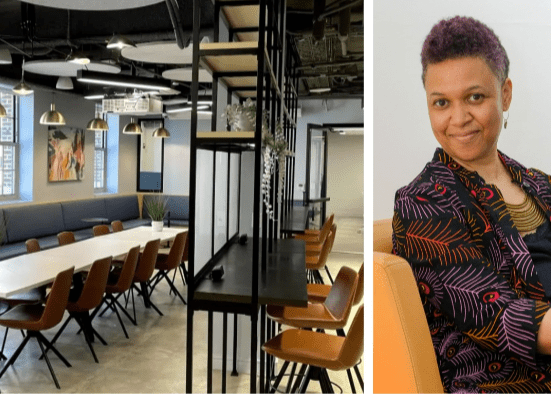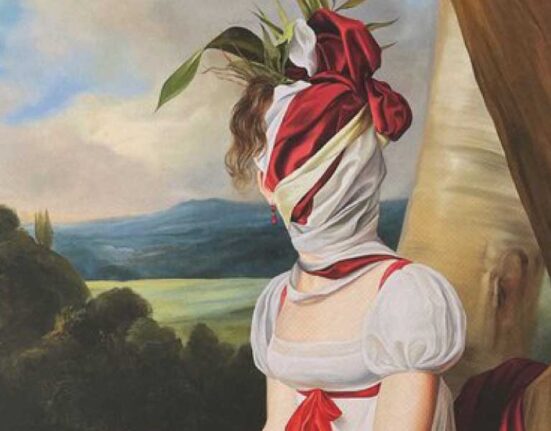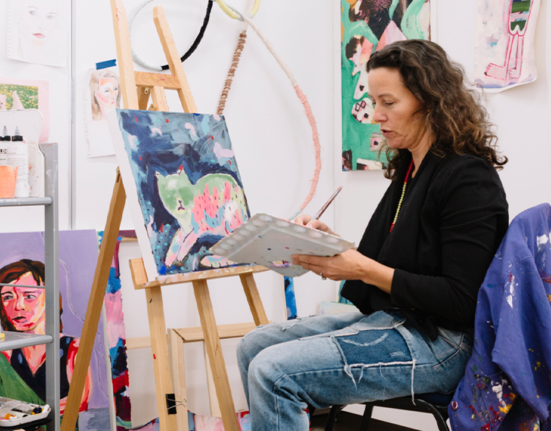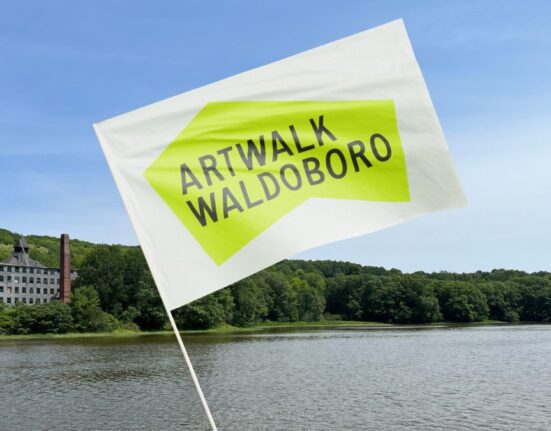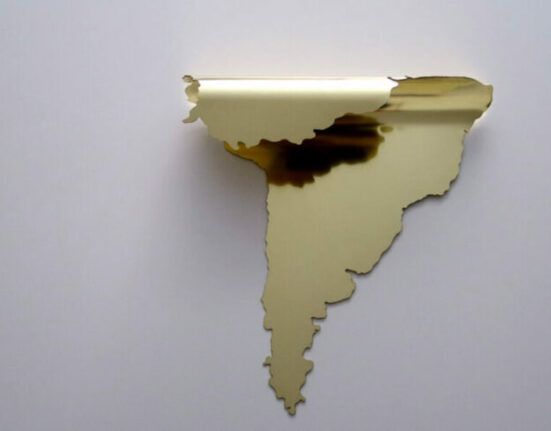In this latest episode of Women in STEAM, Damilola Olusegun, 28, a visual artist, delves into her artistic journey and, most significantly, how her late father led her to art and how platforms like YouTube gave her leverage in the art world.
In 2018, Ms Olusegun had created a substantial portfolio and debuted her work through a self-funded art exhibition at her science academy, involving family support and showcasing talents from her institution and others. The success of the event reinforced her path, earning her the title of Best Young Visual Artist in 2019 by The Everyday Chapter.
PT: Can you walk me through your creative process when starting a new piece? Do you have any specific routines?
Ms Olusegun: When starting a new piece, I am usually inspired by a personal experience, something I have seen, felt, or imagined that I can’t stop thinking about. Inspiration can also come from a book or music.
I like to sit with that inspiration for a while, letting it develop naturally before I pick up my materials. My creative process often begins with quick sketches.
Then, I create my reference by gathering models to bring it to life by taking several snapshots until I have what I want. Then, the real work commences on my canvas. I usually set the mood before I start creating, like putting on a playlist, so that I can focus. I like to pour my all into the whole process, so that way, I come up with something everyone can relate to.

PT: Can you share a particularly meaningful piece you have created and the story behind it?
Ms Olusegun: Most of my works carry some level of personal or emotional story, but one piece that stands out to me is ‘Rooted Reverie’, it is the first piece I created in 2024. It is an artwork that is symbolic. You will notice vines wrapped around a girl. Those vines represent the invisible forces that hold us back, whether they are fears, expectations, or unresolved emotions. The forest reflects both isolation and a kind of stillness that many of us retreat to when overwhelmed.
I created this piece during a time when I felt trapped in a cycle of overthinking and self-doubt, and Rooted Reverie became a visual expression of my desire to break free and grow beyond those internal limitations. The way it resonated with others who came across the piece was something I didn’t expect, which made me realise how universal that feeling of quiet struggle is.
PT: As a self-taught visual artist, what role do you think online platforms like YouTube play in democratising art education?
Ms Olusegun: Online platforms like YouTube have helped my journey as a visual artist. It has made it easy to access knowledge from any part of the world. It is no longer about being in the right art school or having the perfect network; you just have to be curious, consistent, and passionate. I had the freedom to learn at my own pace, explore various styles, and build confidence in my voice as an artist. A platform like YouTube is helping to democratise art by making education more accessible and diverse.
PT: Your self-funded exhibition at your science academy was a pivotal moment. What advice would you give to young artists looking to showcase their work?
Ms Olusegun: The self-funded exhibition was more of a big challenge to me. It tested me in so many ways, but I was able to scale through because I had one thing in mind: I kept being consistent in my practice, and I made that my main priority despite all the challenges. My advice to young artists who want to showcase their work is to hold on to patience while being consistent in their practice, and do it over and over again until you get it right.
PT: Your art often features large-scale canvases. What draws you to this format?
Ms Olusegun: I came across a female artist a few years back, Clio Newton. Her pieces are always on a large-scale surface, and they inspired me so much. Not only were they large, they made the works much more visible and detailed and I keyed into that. The bigger my works, the more details I get to bring into my works, which always get the attention of viewers, and it sparks up conversation.
PT: Have you faced any unique challenges as a young woman in the art world, and how have you overcome them?
Ms Olusegun: As a female artist, I have had challenges of being recognised, and not having any art training or tutor, it slowed my journey a little. I had to learn and unlearn so many things by myself. But with time, I came across artists and mentors who helped me through it, and then the recognition came with my consistency.

PT: How do you see your art evolving in the next few years, and are there any new mediums or techniques you are interested in exploring?
Ms Olusegun: In the coming years, I see my art evolving both in depth and form. While I remain deeply rooted in nature-inspired themes, which often symbolise hope and resilience, I am also beginning to explore more personal narratives around transformation and inner strength. I am interested in experimenting with new materials and layering techniques that enhance texture and emotional depth. I have also started considering ways to make my works purely painting and not the usual mixed media I have always been used to. This is to bring new dimensions to my storytelling. The goal is to create pieces that not only speak visually but also invite viewers into a more immersive experience.
PT: Are there any upcoming projects or exhibitions you are excited about, and what can we expect from them?
Ms Olusegun: Yes, I am currently working on a new body of work that reflects personal growth, how we evolve and rebuild ourselves, just as nature does after storms. This series is more emotional, yet it’s still deeply rooted in my core themes of nature and hope. I am also preparing for an exhibition later this year, which is a continuation of one I had earlier this year in Lagos. It will further develop the visual narrative it started with and offer deeper insight.
PT: How do you see your work contributing to the broader conversation about women in STEAM (Science, Technology, Engineering, Arts, and Mathematics)?
Ms Olusegun: As a woman who is a visual artist, I believe my contribution to the STEAM conversation lies in how I use visual storytelling to reflect the complexity and resilience of the human experience, especially from a female perspective. My work often symbolises growth, cycles, and elements that are very much aligned with the natural world. Through my art, I hope to challenge the boundaries between disciplines and advocate for more space where women can thrive creatively and intellectually.
PT: What role do you think art plays in processing and expressing complex emotions, and how do you tap into that in your work?
Ms Olusegun: Generally, art can interpret emotions that are often difficult to put into words. For me, it’s a way of releasing and transforming pain into something visual and hopeful. I am usually drawn to the inspiration that comes from nature, not just its beauty, but its ability to endure, regenerate, and heal. And that helps me process my own emotions while creating a medium for others to connect with. I don’t try to force meaning into my work; I like to make my work deeply personal so others can relate to it easily.
READ ALSO: Dekunbi Wuraola speaks on shaping policy, mentoring women, leading with purpose
PT: How did your father’s passing influence your artistic journey, and what message do you hope your art conveys about resilience?
Ms Olusegun: My father played a foundational role in my journey as a visual artist. He was the first person to truly see the creative potential in me, even before I fully recognised it myself. He encouraged me, supported me, and helped me take those early steps that shaped who I am as an artist today. His belief in my gift gave me the confidence to keep going. When he passed, it was a deeply painful loss, but it also gave my work a new level of emotional depth. Art became a space where I could grieve, remember, and also honour the resilience he instilled in me.
That’s why many of my works carry themes of hope and quiet strength, even in the face of struggle. Through my art, I want to reflect that strength isn’t just about surviving, it is about healing, transforming, and continuing with purpose, even when carrying loss.

Support PREMIUM TIMES’ journalism of integrity and credibility
At Premium Times, we firmly believe in the importance of high-quality journalism. Recognizing that not everyone can afford costly news subscriptions, we are dedicated to delivering meticulously researched, fact-checked news that remains freely accessible to all.
Whether you turn to Premium Times for daily updates, in-depth investigations into pressing national issues, or entertaining trending stories, we value your readership.
It’s essential to acknowledge that news production incurs expenses, and we take pride in never placing our stories behind a prohibitive paywall.
Would you consider supporting us with a modest contribution on a monthly basis to help maintain our commitment to free, accessible news?
TEXT AD: Call Willie – +2348098788999





